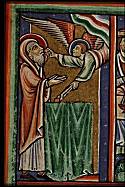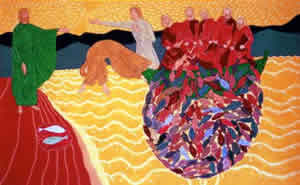I Am What I Am:
Listening to Isaiah, Paul, and Peter
For Sunday February 4, 2007
Lectionary Readings (Revised Common Lectionary, Year C)
Isaiah 6:1–13
Psalm 138
1 Corinthians 15:1–11
Luke 5:1–11
 |
An angel purifies Isaiah's lips (12th century). |
My friend Jen once remarked that when she prepared her sermons on the four readings from the weekly lectionary, she "liked to let them speak to each other and have a conversation among themselves." When the readings don't honestly have anything to do with each other, such "conversations" feel forced and artificial. But this week the lectionary planets align almost perfectly. When we eavesdrop on Isaiah, Paul and Peter as they compare notes on their experiences of God's call, we hear a singular theme. It's a theme that Saint Augustine once confessed with equal parts passion and eloquence: "Lord, what I am for you terrifies me. What I am with you consoles me. For you, I am a priest. With you, I am a Christian."
When the prophet Isaiah had a vision of Yahweh in the Jerusalem temple, dread and terror overwhelmed him: "Woe to me! I am ruined! For I am a man of unclean lips, and my eyes have seen the King, the Lord Almighty" (Isaiah 6:5). Isaiah was one of the most gifted poets in ancient history; even today people who are unfamiliar with the Bible recognize his verse in music like Handel's Messiah. But long before Kierkegaard's famous three stages (the artistic, the ethical, and the religious), Isaiah identified the profound difference between a mere artistic genius who amazes us with cleverness and a genuine apostle who conveys an authoritative word from God. The billowing smoke, thundering voices, and earthquake that he envisioned caused Isaiah to repudiate his literary competence. His vision reads like a science fiction horror story when an angel takes a smoldering coal from the altar with a pair of tongs and sears his lips, the very source of his poetic eloquence.
Andrei Rublev icon of Paul, c. 1420. |
When the apostle Paul pondered how viciously he had tried to exterminate the early Jesus movement, painful memories evoked feelings of deep regret: "I am the least of all the apostles and do not even deserve to be called an apostle," he wrote to the Corinthians (15:9). In seven autobiographical flashbacks on his pre-conversion life, Paul describes how he imprisoned many disciples, dragged them to Jerusalem for punishment, expended every effort to force them to blaspheme, favored the death penalty for them, and opposed the name of Jesus with all his might.1 What he once boasted of as religious orthodoxy he later repudiated as the worst form of self-righteous zealotry. Given his pathology of a violent predisposition, even late in his life Paul still lamented, "I am the worst of sinners" (present tense). In Paul's mind only the "unlimited patience" of God permitted him to move beyond the inertia and regret that his painful memories caused.
When the fisherman Peter worked hard all night and caught nothing at all, but then obeyed Jesus's command to sink his nets into deeper waters, he hauled in a catch of fish that ripped their nets and nearly sunk their boat. When he realized what had happened, when he grasped the inverse relationship between the power of God and his paltry faith, he recoiled before Jesus in fear: "Lord, depart from me, for I am a sinful man!" (Luke 5:8). Peter had other occasions to make this confession. When he rebuked Jesus for predicting his suffering and death, Jesus called Peter "satan" (Matthew 16:23). After denying that he would deny Jesus and then doing so three times, Peter "wept bitterly" (Luke 22:62). Decades later, Paul publicly rebuked him for his blatant hypocrisy and reneging over eating with ritually impure Gentiles (Galatians 2:11–13).
The upshot of these three stories is that human sin, failure, and inadequacy were not obstacles to God's call. He doesn't require a perfect messenger for his message. Because of this, embracing rather than denying our fallenness is the path of liberation and not humiliation. It's an act of candid self-awareness and not misanthropic self-hatred. By it we move from illusion and self-justification to reality and self-acceptance. In our most honest moments of self-awareness we can still offer ourselves to God like Isaiah, "Here am I, send me." Without hedging our bets or adding contingency clauses we can imitate Peter, James, John, and their companions who "pulled their boats up on shore, left everything, and followed Jesus." We can rejoice with Paul that "by the grace of God I am what I am." Most important of all, to Isaiah's dread, Paul's deep regrets and painful memories, Peter's fears, and to our own deeply personal insecurities today, God whispers to us what Jesus said to Peter: "Don't be afraid" (Luke 5:10).
 |
Peter and the Miraculous Catch of Fish, fresco by Bertrand Bahuet, 1995-1996. |
George Herbert (1593–1633) was born to wealth and political power, and after graduation from Cambridge distinguished himself as the university's Public Orator and a member of Parliament. At the age of thirty-six, and despite the objections of friends that he was wasting his life, Herbert renounced his life of privilege and became the pastor at Bemerton, a rural village near Salisbury. In Bemerton he preached, served the pastoral needs of his people with loving distinction, cared for the poor, and helped to rebuild the church using his own resources. Four years later, a month before his fortieth birthday, Herbert died of tuberculosis.
Herbert also wrote poetry, although none of his poems had been published when he died. Upon his deathbed he asked his friend Nicholas Ferrar to publish them only if they might help “any dejected poor soul.” Ferrar did publish the poems under the title The Temple, and they became an enormous success. Published in 1633, by 1680 the book had gone through 13 editions. What attracts many readers to Herbert's poetry even today is not only their literary elegance but his vivid depictions of his lifelong struggles between his privileged background, his worldly ambitions, his deep sense of inadequacy, and our unconditional embrace by a loving God. Consider his sonnet "The Sinner."
Lord, how I am all feverish, when I seek
What I have treasur’d in my memorie!
Since, if my soul make even with the week,
Each seventh note by right is due to thee.
I finde there quarries of pil’d vanities,
But shreds of holinesse, that dare not venture
To shew their face, since crosse to thy decrees:
There the circumference earth is, heav’n the centre.
In so much dregs the quintessence is small:
The spirit and good extract of my heart
Comes to about the many hundredth part.
Yet, Lord, restore thine image, heare my call:
And though my hard heart scarce to thee can grone,
Remember that thou once didst write in stone.
Herbert knew what Isaiah, Paul, and Peter knew, that however dreadful our sin, however painful our memories, and however palpable our fears, God's limitless love is greater still. Or as Paul once said, "where sin abounds, grace abounds all the more" (Romans 5:20).
For further reflection
* With whose experience do you most identify—Isaiah, Paul, or Peter?
* Consider Kierkegaard: "Whoever has learned to be anxious in the right way has learned the ultimate" (Vigilius Haufniensis, The Concept of Dread).
* Which lines of Herbert's poem resonate with you?
* See Donald McCullough, The Consolations of Imperfection; Learning to Live with Life's Limitations.
[1] For Paul's seven autobiographical references see Acts 9:1–2, 22:3–5, 26:9–11, 1 Corinthians 15:9–11, Galatians 1:9–11, Ephesians 3:8, and 1 Timothy 1:12–17.





